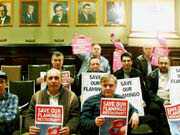Downtown residents spoke out about the fate of the Flamingo Dinner at the City Council meeting Wednesday night. Speakers were divided between keeping the landmark eatery at its 31 Montgomery St. location or relocating it to allow the street corner to be widened.
Early last year, city engineers announced plans to demolish the building the Flamingo is housed in to widen traffic lanes for the nearly completed Goldman Sachs Tower in Paulus Hook. Since then, Flamingo owner Andy Diakos has orchestrated a community effort to keep his diner where it is. Mayor Glenn Cunningham and members of the City Council have expressed their concerns about the matter, with Cunningham urging the diner be relocated and Councilman E. Junior Maldonado supporting a modified version of the street widening, proposed by Diakos.
Paulus Hook resident James Weinert spoke for keeping the Flamingo on Montgomery Street, stating the plans to widen Montgomery and Green streets would cause massive traffic problems in the Exchange Place area, a block from the Flamingo’s location.
Weinert also stressed Flamingo’s historical and community importance. “The Flamingo has been in that location for more than 20 years,” said Weinert. “The Flamingo is the critical heart of the community.”
Speaking as a representative for Goldman Sachs, Chanda Gibson urged the relocation of The Flamingo for various reasons. Gibson argued that the area of Montgomery and Green streets was “basically a cul de sac,” that should be altered to fit in with future development that may happen in the Paulus Hook area. Gibson stressed that the number of cars and trucks moving to and from the Goldman Sachs building would be large.
“It is a safety concern,” said Gibson. “We want the people who will be walking and driving in the area to be safe.”
Gibson was accompanied by a group of people wearing “Safety First” buttons. Gibson said the group was made up of Goldman Sachs employees and Paulus Hook residents.
Ethics Board away
By a vote of 6 to 1, the council voted to override the mayor’s veto of the council’s dissolution of the Municipal Ethical Standards Board. The council wants the board to stay dissolved.
The dissenting vote was from Councilperson Viola Richardson. Councilperson Mary Donnelly and Council President L. Harvey Smith were unable to attend the Wednesday night meeting.
The Ethics Board is a group of six Jersey City residents, divided in half between Republicans and Democrats, who are supposed to decide ethics and conflict of interest questions involving city employees and officials. The board has been the subject of ongoing controversy between the Cunningham administration and the council. Unable to form a quorum at their monthly meetings, the Ethics Board did not have a regular meeting for months before the council abolished it in mid-February.
Council members complained that nominees for the Ethics Board were political allies of the mayor, therefore politicizing the board. The conflict between the mayor and the council has concerned appointees to a number of municipal boards and agencies.
Cunningham vetoed the dissolution of the Ethics Board late last week, stating that the recent federal investigations on the county level created a need for the Ethics Board. Cunningham further noted that some council members, such as Maldonado and Councilman William Gaughan, hold county jobs.
“The county has an Ethics Board, and they [the council] don’t complain about that.” said Cunningham before vetoing the council’s decision.
Maldonado said the council over ruled the mayor’s veto because the Ethics Board was not functioning properly. “The Ethics Board was stagnant,” Maldonado explained. “The Ethics Board could not conduct business and it did not have legal counsel. It was in the best interest of Jersey City that the board be abolished.”
Maldonado added the council would not be adverse to the recreation of a new Ethics Board, provided a system was in place to select non-biased candidates.
With the dissolution of the municipal Ethics Board, all complaints about Jersey City employees and officials are now referred to the Ethics Board of the state’s Local Finance Review Board.
As of Friday, the mayor’s office made no comment on the council actions regarding the Ethics Board.
War or peace?
The council also heard from residents regarding two resolutions passed by the council regarding the possible war with Iraq.
In late January, Donnelly proposed a resolution urging President George Bush to exhaust all diplomatic possibilities to disarm Iraq before going to war.
However, at the end of the Feb. 11 meeting, Smith proposed a resolution requesting the president to use all means possible to disarm Iraq. According to City Clerk Robert Byrne, Smith put forward this resolution as service to Jersey City resident Dominick Pugliese.
The majority of the speakers opposed the possible war with Iraq, stating their belief that the war would be nothing but a forced confiscation of Iraq oil reserves.
“This unjust war for oil will cost American lives and money,” said Jersey City resident Erik-Anders Nilsson, representing the Hudson County Coalition for Peace and Justice. “Let’s ask the 1,000 homeless in Jersey City that we know of if we should build them a shelter or spend $200 billion to occupy Iraq.”
Pugliese spoke in favor of the Bush administration’s efforts against the Iraq regime. Pugliese pointed out inconsistencies in the anti-war protesters’ efforts.
“In 1993, President Bill Clinton sent our troops into Bosnia,” said Pugliese, noting the crimes of then-Bosnian leader Slobodan Milosevic made Saddam Hussein’s look paltry by comparison. “Where were you protestors then?”
Our Digital Archive from 2000 – 2016
